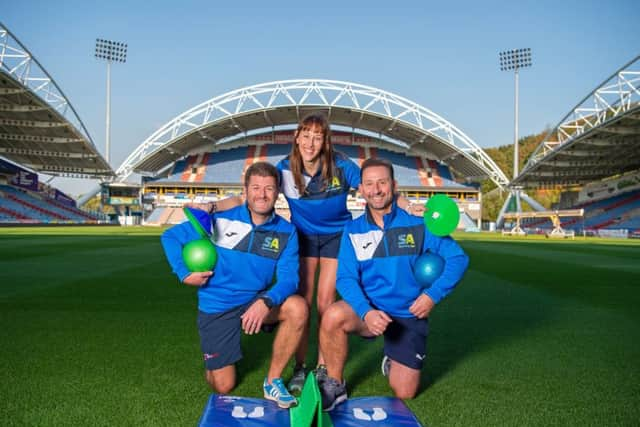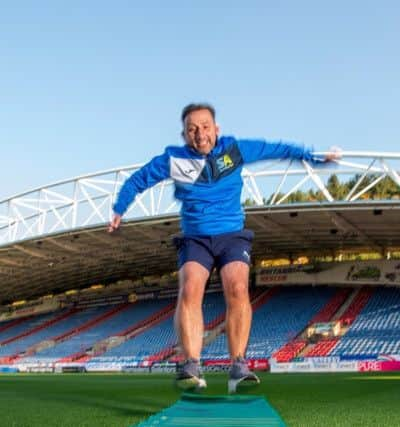Shaun Fox looks to tackle the question of a lack of sport among children with Sporting Age
For the past couple of years the John Smith’s Stadium has been basking in the limelight with Huddersfield Town Football Club taking on the might of the Premier League.
But in the shadows of the stadium, three sports enthusiasts have also been busy, building their own social enterprise to get young people more active.
Advertisement
Hide AdAdvertisement
Hide AdShaun Fox heads up Sporting Age, a fitness programme designed for primary school children.


The former PE teacher set the business up as he, alongside directors Jonny Nolan and Andrea Springthorpe, wanted to make a national impact on the fight against childhood obesity having made progress on this front across Kirklees with Legacy Sport.
That social enterprise, set up in 2011 and which today has 19 staff, still provides coaching, out-of-school-hours clubs, cycle training and holiday camps across West Yorkshire.
Mr Fox said: “We wanted to develop physical literacy in young people to allow them to become confident movers. We wanted to grow that regionally and nationally so we’ve developed Sporting Age.”
Advertisement
Hide AdAdvertisement
Hide AdSporting Age is a ten-week programme. The organisation goes into primary schools and carries out an initial baseline assessment on fundamental movement skills.


“We then provide interventions for an eight-week period to help teachers provide the right stage of lesson plan,” Mr Fox says. “We do a second assessment in week ten, which demonstrates progress for individuals.”
A lack of physical exercise amongst young people is a major concern.
Mr Fox said: “When young people start primary school aged four and five, 20 per cent of them are either overweight or obese. By the time they leave primary school at the age of 11, that figure rises to 35 per cent.
Advertisement
Hide AdAdvertisement
Hide Ad“Between those years, ages four to 11, something is going drastically wrong in terms of activity levels, nutritional advice etc.
“What we’re trying to do is give those young people more confidence so that they are more likely to engage in lifelong physical activity.”
The lack of exercise in young children is down to a number of different reasons, according to Mr Fox.
He said: “One of them is the alternative provisions and entertainment via games, online offerings etc. Young people tend to be more sedentary than they were in years gone by.
Advertisement
Hide AdAdvertisement
Hide Ad“There’s more traffic on the roads and playing out seems to be a thing of the past.
“We also feel that schools are so pressured to prioritise numeracy and literacy that sometimes they’re not providing the full two hours of PE.”
The prevalence of screen-based technology means that PE lessons in schools need to do more to capture the imagination of children.
“What we’re finding is that the screens are so animated, they attract the attention of young people really well,” Mr Fox says. “If we’re being brutally honest, sometimes the PE provision in schools has not changed over the last 20 years.”
Advertisement
Hide AdAdvertisement
Hide Ad“We’ve got to improve the level of PE provision and we’ve got to engage them as much as they’ve been engaged by those screens,” he added.
Sporting Age is a service that schools pay for but there is ring-fenced funding, which Mr Fox says he’d like primary schools to “make best use of”. Whether that is on a programme like his enterprise’s or initiatives offered by other providers.
He wants everyone to work towards the 30:30 objective, whereby young children are active for 30 minutes in a school setting and another 30 minutes of physical activity is replicated outside of school hours.
The former PE teacher added: “Quite a key part of it is improving the competence and confidence of primary school teachers. The training access is really woeful. In some cases it can be eight hours over three years.
Advertisement
Hide AdAdvertisement
Hide Ad“If their training is better, they’ll be more confident in delivering. They can enthuse the young people and hopefully get them involved in higher levels of physical activity.”
While Sporting Age is in its infancy, Mr Fox is unable to provide definitive data that suggest children from disadvantaged backgrounds suffer disproportionately when it comes to physical literacy.
However, through Legacy Sport’s Bikeability programme he witnessed “significant inequalities”.
“I would assume that those inequalities are sort of proportionate to physical literacy as well,” he added.
Advertisement
Hide AdAdvertisement
Hide AdSports aren’t just a great way of getting young children active but also provide positive role models, according to Mr Fox.
Many major sporting events in this country are often no longer on free-to-air television and this can deprive young people, from disadvantaged backgrounds, of positive role models.
He said: “The likelihood is, in those areas of deprivation, if young people are being excluded from seeing positive role models involved in sport then that can have a detrimental effect on their involvement.” The ultimate aim for Sporting Age is to help get young children, from up and down the country, active.
“We want it to be a recognised national programme that will help young people improve their physical literacy,” Mr Fox says.
Advertisement
Hide AdAdvertisement
Hide AdThe business is already gaining recognition. Ken Davy, chairman of rugby league club Huddersfield Giants, has been providing advice to the social entrepreneurs over the past year. More recently he agreed to become chairman of Sporting Age.
Mr Fox believes he will bring “an untold amount of business acumen” to Sporting Age.
“Hopefully he will help us avoid silly mistakes as we try to grow,” Mr Fox said. “He’ll provide a great sounding board.”
Legacy Sport will continue, Mr Fox said.
“We’ve got to make sure the instructors there can now manage that business,” he added.
Advertisement
Hide AdAdvertisement
Hide AdSport has been a passion of Shaun Fox from an early age. Whether that be football, cricket or, today, crown green bowls.
He also has another business, which he helps his brother run, called Ballcraft Engravers in Huddersfield.
“We provide trophies, medals, engraving services, personalisation services for lots of sports clubs and schools,” Mr Fox said.
Whether it’s creating medals and trophies or physical activity programmes, one thing is for sure and that is Mr Fox’s passion for sharing his love of sport with future generations.
Curriculum vitae
Title: CEO of Sporting Age
Lives: Kirkheaton, Huddersfield
Favourite holiday destination: Cornwall
Last Book read: Key Person of Influence by Daniel Priestley
Favourite Film: Top Gun
Favourite Song: Never Gonna Give You Up by Rick Astley
Car: Renault Kadjar
Most proud of: My two sons
Education: B.Ed Hons Health & Physical Education/Fitness from Edge Hill University